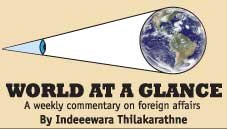|

Fitch revises outlook on France to ‘negative’
Fitch said a solution to the eurozone crisis was “technically and
politically beyond reach”
A negative outlook usually means a downgrade is possible in 12-18
months.
Fitch said the change in outlook was prompted by the heightened risk
of government liabilities arising from the eurozone’s debt crisis.
The agency also said it was considering downgrading ratings for
Belgium, Spain, Slovenia, Italy, Ireland and Cyprus.
“Following the EU Summit on 9-10 December, Fitch has concluded that a
‘comprehensive solution’ to the eurozone crisis is technically and
politically beyond reach,” the agency said in a statement.
The six countries already had a negative outlook. Their ratings have
now been placed in “credit watch negative”, which means a downgrade is
possible within three months.
The revised outlook on France comes in a week when senior French
figures have criticised the economic situation in the UK, with Finance
Minister Francois Baroin describing it as “very worrying”.
And the French central bank chairman has suggested the UK’s credit
rating should be downgraded - ahead of France.
But Fitch said: “Relative to non-euro area ‘AAA’ peers, notably the
US and the UK, the risk from contingent liabilities from an
intensification of the eurozone crisis is greater in light of its
commitments to the European Financial Stability Facility and the
European Stability Mechanism, as well as indirectly from French banks
that are less strong than previously assessed as reflected in recent
negative rating actions by Fitch.”
It also said that compared with other eurozone countries with a
rating of AAA, it judged France to be the most exposed to a further
intensification of the crisis, citing France’s larger structural budget
deficit and higher government debt burden.
Another agency, Standard & Poor’s, warned earlier this month that
France’s rating could suffer over the eurozone crisis.
Syrian National Council holds congress in Tunisia
The Syrian National Council, a coalition of groups opposed to
President Bashar al-Assad, is holding its first congress in Tunisia.
About 200 members of the SNC are meeting near the capital Tunis in a
bid to further unify the Syrian opposition.
Correspondents say delegates hope the council will emerge looking
more like a government-in-waiting.
Earlier, thousands of anti-government protesters again took to the
streets across Syria following Friday prayers.
Activists said at least six people had been killed by security forces
in the central city of Homs, which has become a focal point for unrest.
“We need to unite the opposition and make it stronger,” SNC leader
Burhan Ghalioun told AFP news agency.
Institutional Dutch Catholic abuse ‘affected thousands’
Tens of thousands of children have suffered sexual abuse in Dutch
Catholic institutions since 1945, a report says.
The report by an independent commission said Catholic officials had
failed to tackle the widespread abuse at schools, seminaries and
orphanages.
But the report also found that one in five children who attended an
institution suffered abuse - regardless of whether it was Catholic.
“This episode fills us with shame and sorrow,” said a bishops’
statement.
The commission, which began work in August 2010, sought to uncover
what had gone on and how it had happened, and examined what kind of
justice should be offered to victims.
It was triggered by allegations of abuse at a Catholic school in the
east Netherlands, which prompted other alleged victims to come forward.
It studied 1,800 complaints of abuse at Catholic institutions,
identifying 800 alleged perpetrators, just over 100 of whom are still
alive. It also conducted a broader survey of more than 34,000 people, to
gain a more comprehensive picture of the scale and nature of abuse
suffered by Dutch minors.
UN lifts sanctions on Libya’s key banks
The UN Security Council has lifted sanctions on Libya’s central bank
and the country’s foreign investments banks, diplomats say. They say the
move is aimed at easing a current cash crisis in Libya.
The US followed suit shortly afterwards, lifting “most” sanctions
against Tripoli. The Libyan banks’ assets abroad were frozen earlier
this year as part of sanctions against former Libyan leader Col Muammar
Gaddafi. On Friday, the UN Security Council decided to lift the
sanctions on the Central Bank of Libya and its investments subsidiary -
the Libyan Foreign Bank.
Last Friday, the council agreed to unfreeze the assets - unless there
were objections - by 17:00 local time (22:00 GMT) on 16 December. As
that deadline passed, no objections had been received, the diplomats in
New York said.
The UK Foreign Secretary, William Hague, said that the move “marks
another significant moment in Libya’s transition”.
“It means that Libya’s government will now have full access to the
significant funds needed to help rebuild the country, to underpin
stability and to ensure that Libyans can make the transactions that are
essential to everyday life,” Mr Hague said in a statement.
He added that London would now free some £6.5bn held in Britain.
US ‘Barefoot Bandit’ Colton Harris-Moore jailed
A US man known as the “Barefoot Bandit” has been sentenced to more
than seven years in a state prison after pleading guilty to a string of
charges.
Colton Harris-Moore, 20, made global headlines during a two-year
crime spree in which he evaded police in stolen cars, boats and planes.
Footprints left at some of the crime scenes earned him his nickname.
He told the court in Washington state that his childhood was one he
wouldn’t wish on his “darkest enemies”.
He stood with his wrists shackled and made no reaction as the
sentence was delivered in the packed courtroom in Coupeville.
Judge Vickie Churchill described Harris-Moore’s early life with an
alcoholic mother and a series of her convict boyfriends as a
“mind-numbing absence of hope”. |

